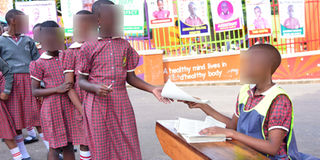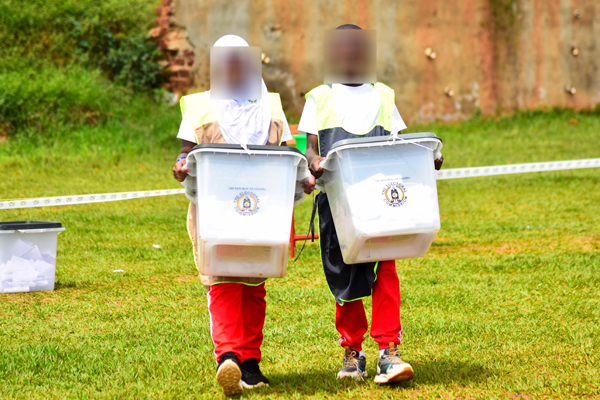
A candidate (left), who was contesting for Head Prefect position, poses with her supporters. Branded t-shirts are some of the materials candidates use to canvas votes in schools. PHOTOS | NOELINE NABUKENYA
Offering money, sweets, and other inducements during children’s campaigns in schools now buys more votes than empty words.
The schoolchildren have caught in their infancy the adult political bug, including all its obscene display of pomp, financial muscle, and open bribing of voters.
Recently, pupils from a city school in Kampala were seen cruising around the school premises in fancy and top-of-the-range LandCruisers, complete with outriders, and brass bands music during campaigns.
The video that did the rounds on social media caused a stir among parents, educationists, and other stakeholders, who called on the Ministry of Education and Sports to set guidelines to regulate school politics across the country.
Sources say these extravagant campaigns in schools are forcing out competent candidates who fail to meet the stiff demands set by other competitors, who give out sweets, money and other inducements, and impress their young voters with lunches and rally drives around the school.
In the past many children looked forward to their school campaigns, but things have now changed, with some parents choosing to stop their children from participating, while others are forced to take loans or spend big for their child to become a prefect or a leader in primary or secondary school.
In most cases, the schools tag benefits to leadership positions such as wearing unique uniforms to distinguish from other students, wearing position tags, having tastier meals that are different from what other students take, and offering half or full bursary on school fees, among others.
Mr Andrew Manishimwe, a resident of Nansana Municipality, is one such parent who was forced to fork out a bribe to facilitate a child’s campaigns at an undisclosed school.
“When my son told me he stood for a leadership position in the school. I went to the school and talked to the deputy head teacher about my son’s interest. He told me I would have to find some means to give his fellow learners “something”. He advised me to invest in money and buy some stuff for them,” Mr Manishimwe explains.
“ I went back home and sat with my son to negotiate on what to deliver. Eventually, I put aside about Shs500,000 to cater for sweets, T-shirts and geometry sets for the pupil voters. I also gave out hard cash to his teachers and the school electoral commission,” he adds.
He also reveals that at his son’s school even the pupil who wins in an election is given a special treatment with other benefits such as a full bursary, and quality meal that is different from what other students take, among others. This could possibly force Mr Manishimwe to struggle harder for his son’s successful victory.
“ I saw that I was benefiting because I realised I was not going to continue sweating for his school fees for one year during his term in office, and also footing other bills. As I speak, I don’t regret the money I invested because it has yielded good results,” he adds.
Although he acknowledges what he was doing was wrong, he contends that the situation at school forced him to bribe his way into attaining his son’s dream of being a leader and also to keep the family legacy of leadership.
“This is a common practice and it is also the norm in some big schools. There is no way you can avoid it if you are wishing your child to do well,” he notes.
Mr Manishimwe also claims that teachers come to their homes, to give them tips on how their children can win elections.
“ You are at your home and the teacher comes. You would think maybe there is a problem at school, but surprisingly, when you ask about what brought him, he tells you about how my son can win the elections at school,” he notes.

A videograb of pupils campaigning atop cars at a primary school in Kampala City recently. PHOTO | COURTESY OF NTV UGANDA
Similarly, Mr Alvin Mutebi, a researcher and advocate at the Anti Corruption Coalition Uganda, has a child who is contesting for a leadership position in school. He says although corruption is rampant in this school, he always advises his son to concentrate on his manifesto instead of bribing voters with material things.
“We are killing the idea of meritocracy and replacing it with monetisation of leadership, which is absolutely wrong because these young people are the ones that are going to feed into the leadership of tomorrow.
“But we are indirectly promoting corrupt leaders in the guise of them running their political campaigns or their political aspirations, which would not be something realistic because at the end, we would want to have leaders of substance,” Mr Mutebi says.
He says bribery and the showbiz limits possibilities, undermines competent and talented learners who would have the capacity to take on leadership positions. He also says the practices instil bad morals in children both politically and socially.
“Because at the end, their mindset will be shaped not to speak to merit, but what materials somebody puts on the table, and the votes are not influenced by the discussion that somebody puts across, hinged on the contribution that somebody is willing to make to a specific environment or a specific community,” he explains.

Successful prefects take oath at one of the primary schools recently.
Mr Gerald Walulya, a lecturer at Makerere University, termed the practice of financing school elections as “pathetic”.
“It gives a wrong orientation to students of what politics should be. It is also bad because it discourages the participation of students from humble backgrounds since they have no money to bribe voters and donate expensive gifts. At the end of the day, the elected leaders may be the ones who spend the most money instead of those who might be most qualified,” he warns.
Mr Walulya adds that this kind of practice is borrowed from what is happening in national politics, and calls for reforms in the conduct of national elections.
Mr Frank Kabuye, the Kassanda South MP, says with the commercialisation of school politics, the country is building incompetent leaders who are not willing to serve.
“In this we are building leaders that are not going to care for a generation that will come after them, but will care only for their next elections as they will have to accumulate wealth and sponsor their campaigns without looking at what really needs to be addressed in a society,” he notes.
Mr Kabuye adds that such behaviour puts other children who cannot afford to facilitate their campaigns at risk of suffering mental health-related problems.
“So if we deny them the chance to face a free world where they can express themselves freely, that means we are limiting their abilities and chances to seek other positions in leadership at national level or education,” he adds.
Mr Kabuye said: “We must go back to the ways we used to do it, because even our times. We used to have leaders, but we never saw the campaigns being done with bands leading the team, having Land Cruisers in school compound, taking students, people for lunch, at an outside quarantine, that would never happen, but we had better leaders and we gave out leadership with the positions we served in.”

Pupils line up to cast their votes at a primary school recently.
EC commissioner speaks out
Dr Sallie Simba Kayunga, the newly appointed commissioner of Electoral Commission, notes that the state of national politics has led to a total mess in school politics.
”It distorts democracy and the electoral process. On average for one to be elected as a Member of Parliament, one has to use Shs5,000,000. So, that is not good for democracy because it blinds people’s choices and it is even worse when our children start dishing out sweets in order to secure their electoral victory,” Dr Kayunga emphasises.
He says the Electoral Commission plans to visit the schools to participate in their electoral process and sensitise the candidates and the voters about the principles of democracy.
“However, we would like to go to schools to carry out this activity but we have a problem of budget shortfalls. Right now, the district electoral administrator gets Shs600,000 per month. So, this is not enough to facilitate the sensitisation activity in all schools in the district,” he says.
Education and Sports ministry reacts
Dr Denis Mugimba, the spokesperson for the Ministry of Education and Sports, said: “We are not paying a deaf ear to these trends, we hear and we have taken note. However, I am constrained in how much I should talk about that act because the minister is soon going to address this issue in a press briefing,”
Who to blame?
Mr Vincent Ssempiira, the deputy head teacher of Skys Junior school says although the schools are blamed for allowing such practices, he says parents are also champions in fuelling corruption in their children.
‘“One day a teacher came to me and told me that my parents. Were on him asking him to rig votes in favor of their children, and most of them were giving him the money. I told them to not accept it because it is against our school electoral guidelines,” he adds.
He further notes that the kind of prizes schools offer to candidates who go through; also make parents invest all efforts to make their children succeed.

Polling assitants at a recent election exercise
However, Mr Mutebi, an anti-corruption advocate and researcher, says, ”The schools take the blame because they have to set parameters or minimum standards through which these people can actively participate in these processes. If we do not groom them well it means we will have non-grounded leaders,”
The Buhweju County MP, Mr Francis Mwijukye, shifts the blame to the current government, during campaignS saying it has not done enough to control these activities at the level.
“Corruption has become a way of life in Uganda and survival of the regime. This happens during national elections, secondary schools elections, political party internal elections, university elections, and now primary and nursery schools,” he adds.
But Mr Manishimwe says the parents and government are responsible for this practice because they all play a part in supporting the child in any way.
MONEY IN POLITICS
Ole Therkildsen, Moses Khisa and Jamal Msami in a chapter titled ‘‘Campaign financing and revenue bargaining in Tanzania and Uganda’’ in The politics of revenue bargaining in Africa, assert that the future of democracy in Africa will mean more money in politics as richer businesspeople help to finance (especially) the ruling party presidential and parliamentary election campaigns. In this way funders seek to buy influence over government policies that affect them and their business
operations - for example in getting tax exemption, favours in land deals or in import licensing.
On September 5, 2023, President Museveni warned politicians, especially members of the National Resistance Movement (NRM) party, against using their own money to solve problems of their constituents.
“I don’t know why you use money in politics. That is a very big mistake. I would really advise you that this is wrong, counterproductive and unnecessary. Stop this bad politics,” Mr Museveni said.
What stakeholders say...
Ronald Ssemaganda, Namungoona H. School director.
The schools can create positions that need direct appointment from school management and that appointment should be for students who have the capacity and ability to serve others genuinely, but do not have money to run the campaigns.

A tag of a prefect in one of the primary schools. PHOTO/DOROTHY NAGITTA
Dr Sallie. Simba, Electoral Commission member.
We have stories of people even using Shs1.5b to secure elections. That is bad but it is even worse when our children in nursery, primary and secondary schools and the university dish out sweets to secure electoral postal victory.
Dr Gerald Walulya, Lecturer at Makerere University.
The government and schools need to set rules that outlaw the use of money and gifts during elections. In primary schools, teachers could select leaders because at that age, the children are not mature enough to elect good leaders. Also, losing candidates lack maturity to digest the reality of losing an election.
Ms Betty Ethel Naluyima, Wakiso Woman MP.
We urge the ministry of Education to regulate before the situation worsens.Not everything should be about money. But you find that if you don’t have money, you can not take on the responsibility namely leadership.
Ms Hope Nakazibwe, Mubende District Woman MP.
We should stop elections in primary schools and let teachers appoint these leaders themselves. After appointing leaders, teachers should train them so that they get skills that will guide them even after school.
Mr Andrew Manishimwe, a parent from Nansana.
The ministry of Education and Sports should set guidelines and penalise people who fail to abide by them. I believe if this one is put in place, this kind of politics will not happen again.



